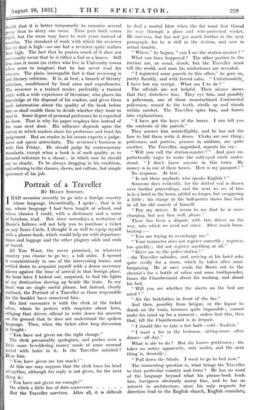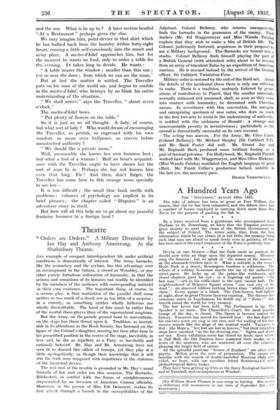Portrait of a Traveller
BY HELEN SIMPSON.
T HAD occasion recently to go into a foreign country whose language, theoretically, I spoke ; that is to say, whose language I had been taught at school, and whose classics I could, with a dictionary and a sense of boredom, read. But since nowadays a recitation of Dante's Inferno will not help you to purchase a ticket on any Inner Circle, I thought it as well to equip myself with a phrase-book, which would help me with departure- times and luggage and the other plaguey odds and ends of travel.
All You Want, the cover promised, in whatever country you choose to go to ; a tall order. I opened it conscientiously in one of the intervening trains, and settled down .to acquaint myself with a dozen necessary idioms against the time of arrival in that foreign place. An hour later I looked out, surprised, to find the lights of my destination slowing up beside the train. In my head was no single useful phrase, but instead, clearly outlined, the Portrait of a Traveller as those responsible for the booklet have conceived him.
His first encounter is with the clerk at the ticket office, whom he pesters with enquiries about fares, obliging that driven official to write down his answers on the ground that he does not understand the spoken language. Then, when the ticket after long discussion is bought : " You have not given me the right change."
The clerk presumably apologizes, and pushes over a little more bewildering money made of some unusual metal with holes in it. Is the Traveller satisfied ? Hear him.
" You have given me too much ! "
At this one may suppose that the clerk loses his head altogether, although his reply is not given, for the next thing is " You have not given me enough!"
On which a little line of dots supervenes But the Traveller survives. After all, it is difficult to deal a mortal blow when the fist must first thread its way through a glass and wire-protected wicket. He survives, but has not got much further in the next paragraph, for he is still in the station, and now in actual trouble.
" Where," he begins, " can I see the station-master ? "
What can have happened ? The other parties to the ruction are, as usual, dumb, but the Traveller must tell the world, and soon his misfortunes are revealed.
" I registered some parcels to this office," he goes on, pretty fluently, and with forced calm. " Unfortunately, I have lost my receipt. What am I to do ? "
The officials are not helpful. Their silence shows that they disbelieve him. They eye him, and possibly a policeman, one of those moustachioed Continental policemen, armed to the teeth, strolls up and stands within earshot. The Traveller spies him, and bursts into explanations.
" I have got the keys of the boxes. I can tell you the contents of the parcels."
They answer him unintelligibly, and he has not the face to bid them write it down. Clerks are one thing ; policemen and porters, persons in uniform, are quite another. The Traveller, anguished, repeats his cry : " Will you call the station-master ? " And goes on, pathetically eager to make the cold-eyed circle under- stand. " I don't know anyone in this town. My money is in one of these boxes. Here is my passport " No response. At last : " Is not there anybody who speaks English ? "
Someone does evidently, for the dotted veil is drawn over further proceedings, and the next we sec of him is in a hotel in the town, pitiful no longer, but swaggering a little ; his charge to the hall-porter shows him back in all his old conceit of himself.
" Pay my driver. It seems to me that he is over- charging, but pay him well, please."
There has been a dispute with this driver on the way, into which we need not enter. After much brow- beating :- " You are trying to overcharge me."
" Your taximeter does not register correctly ; registers too quickly ; did not register anything at all."
" Drive me to the police-station ! "
—the Traveller subsides, and arriving at his hotel asks quite civilly for a room, which he takes after some bargaining. He at once sends the Boots out to the chemist's for a bottle of saline and some toothpowder, fusses the Chambermaid about his washing, and about his bed.
" Will you see whether the sheets on the bed are aired ? "
" Air the bedclothes in front of the fire."
And then, possibly from fatigue, or the liquor he drank on the train, becomes quite impossible ; cannot make his mind up for a moment ; orders first this, then that, till the Chambermaid is in despair.
" I should like to take a hot bath—cold—Turkish." " I want a fire in the bedroom---sitting-room—after dinner—all day."
What is she to do ? But she knows gentlemen ; she takes no notice apparently, only smiles, and the next thing is, drowsily ; " Pull down the blinds. I want to go to bed now."
The tormenting question is, what brings the Traveller to that particular country and town ? He has no word of the language beyond what his phrase-book lends him, foreigners obviously annoy him, and he has no interest in architecture, since his only requests for direction lead to the English church, English consulate, and the zoo. What is he up to ? A later section headed "At a Restaurant" perhaps gives the clue.
We may imagine him, point-device in that shirt which he has bullied back from the laundry within forty-eight hours, coming a little self-consciously into the smart and noisy place. A maitre-d'hôtel approaches him, but for the moment he wants no food, only to order a table for the evening. I t takes long to decide. He wants : " A table nearer the window ; smaller than this one ; not so near the door ; from which we can see the room."
But at last the matter is settled. The Traveller puts on his man of the world air, and begins to confide in the maitre-d'hôtel, who betrays by no blink his entire understanding of the situation.
" We shall arrive," says the Traveller, " about seven o'clock."
The maitre-d'hôtel bows.
" Put plenty of flowers on the table."
So it is just as we all thought. A lady, of course, but what sort of lady ? Who would dream of encouraging the Traveller, so pettish, so engrossed with his own comfort, so mean over halfpence, so craven before moustached authority ?
" We should like a private room."
Well, presumably she knows her own business best ; but what a fool of a woman ! Half an hour's acquaint- ance with the Traveller ought to have shown her the sort of man he is. Perhaps she has not known him even that long. Fie ! And then, don't forget, the Traveller has come here to this strange town specially to see her— It is too difficult ; the small blue book swells with problems ; volumes of psychology are implicit in its brief phrases ; the chapter called " Disputes " is an adventure story in itself.
But how will all this help me to go about my peaceful feminine business in a foreign land ?































 Previous page
Previous page